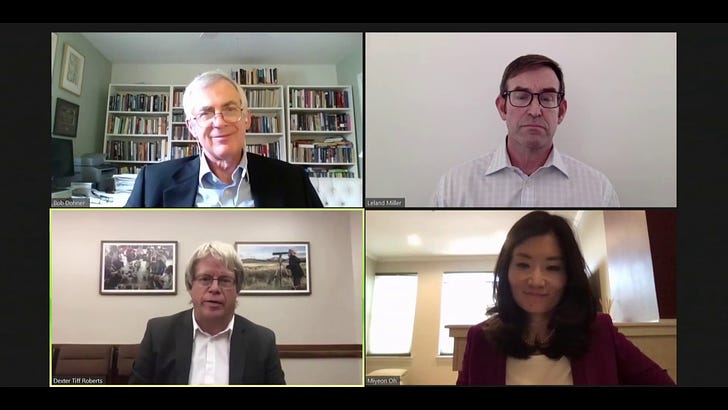Welcome to newsletter 24. In the last week American senators have introduced a bill aimed at China’s technology theft. Meanwhile, China announced it will spend $1 trillion in an effort to leapfrog U.S. technology capabilities.
Thought of the week (year, decade..) - while punitive actions against China’s unfair trading practices may be necessary, the U.S. had better also expend a lot more effort and money on doing key research and development to ensure it doesn’t get eclipsed technologically by China on 5G, 6G, robotics, AI, and more.
Better than battering
That‘s a point I made in reference to a question on Huawei (starts at 37:40) in this discussion I joined last week with former longtime Treasury department senior official Robert Dohner, China data collection agency China Beige Book’s CEO Leland Miller, and Miyeon Oh, director of the Asia Security Initiative at the Atlantic Council.
Diminishing American tech leaders
As also mentioned above, one sure way to hurt U.S. competitiveness is for Washington to put more visa restrictions on Chinese technology students. James McGregor, longtime businessman in China and author, warns in a tweet that visa blocks “would be a great way for the US to diminish American tech leaders.”
Also check out MacroPolo’s Global AI Talent Tracker which finds that the U.S. today has a “large lead” in top-tier AI research while also noting that two-thirds of AI researchers working in the United States “received undergraduate degrees in other countries.”
“China is the largest source of top-tier researchers, with 29% of these researchers having received undergraduate degrees in China. But the majority of those Chinese researchers (56%) go on to study, work, and live in the United States,” the report notes.

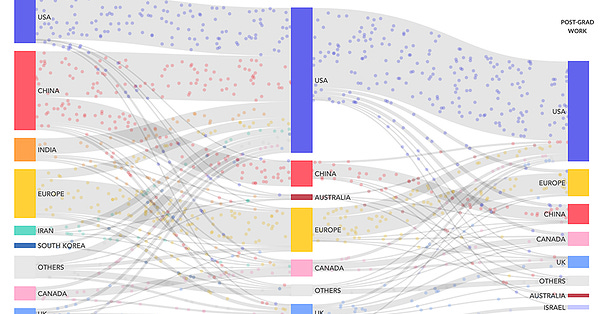
There will be penalties
Two American senators have introduced a bill that requires that the U.S. president report twice a year on foreign companies and individuals that are believed to be stealing U.S. trade secrets and respond with penalties, including economic sanctions, reports Reuters.
Introduced by Democratic Senator Chris Van Hollen and Republican Senator Ben Sasse the bill could freeze the U.S. assets and bar American companies and individuals from doing business with those accused of theft and is clearly aimed at China.
“I think there is a big deterrent benefit to making it clear upfront that when we find this kind of theft, there will be penalties,” Van Hollen said.
China’s trillion-dollar campaign
According to a plan announced earlier this year by China’s Ministry of Industry and Information Technology, a minimum of $1.4 trillion will be invested over the next five years into artificial intelligence, data centers, mobile communications and more.
“China has embarked on a new trillion-dollar campaign to develop next-generation technologies as it seeks to catapult the communist nation ahead of the U.S. in critical areas,” the Wall Street Journal reports. “Since the start of the year, municipal governments in Beijing, Shanghai and more than a dozen other localities have pledged 6.61 trillion yuan ($935 billion) to the cause,” the article says.

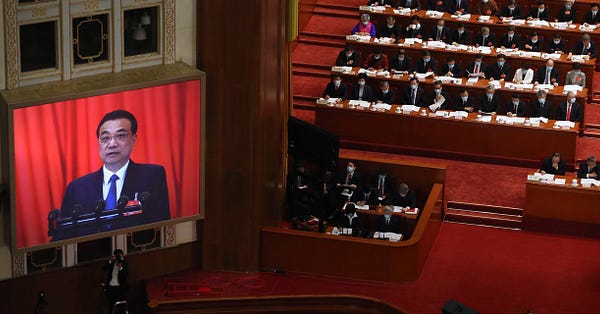
Abandoning the gospel of free trade
Trump’s trade war has not resuscitated U.S. manufacturing nor has it pushed global supply chains to relocate out of Asia, argues Noah Smith in Bloomberg Opinion. That failure plus “weakness of the traditional free-trade system that was glaringly exposed by the coronavirus shutdown,” has think tank American Compass advocating a radical shift in U.S. policy, something they call the “Reshoring Initiative,” the columnist explains.
The new think tank advocates for, as Smith puts it, “abandoning the gospel of free trade and embracing industrial policy” and a “wholesale reordering of the relationship between government and industry in the U.S. that goes against decades of orthodoxy.”
“The Reshoring Initiative recommends not just traditional policies such as workforce training and tax incentives, but bold and novel steps like domestic-content requirements for manufacturers, major alterations to the World Trade Organization and government-sponsored corporate research consortiums,” Smith writes.

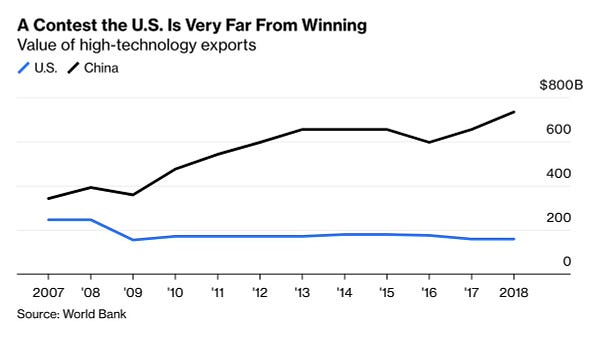
Agreeing to China’s demands
New concerns have flared about Zoom, the video-conferencing company that has become ubiquitous during the virus quarantines, and whether it is too answerable to the Chinese government’s calls for censorship.
Zoom admitted last week that the Chinese government requested that it “suspend the accounts of several U.S.- and Hong Kong-based Chinese activists for holding events commemorating the anniversary of the 1989 Tiananmen Square massacre,” Axios reports. “The statement indicates that Zoom is agreeing to China's demands to construct an in-company censorship apparatus to prevent mainland users from accessing sensitive meetings.”


Weakening Washington’s greatest asset: alliances
China is starting to root for a Trump victory, writes Bloomberg News. “If Biden is elected, I think this could be more dangerous for China, because he will work with allies to target China, whereas Trump is destroying U.S. alliances,” said Zhou Xiaoming, a former Chinese trade negotiator, speaking to the financial news agency.
“Four current officials echoed that sentiment, saying many in the Chinese government believed a Trump victory could help Beijing by weakening what they saw as Washington’s greatest asset for checking China’s widening influence,” the article notes.

Notable/In Depth
How can we stop the U.S. and China from entering an “information winter” was the topic of this fascinating discussion moderated by Politico’s David Wertime.
With Wall Street Journal reporter Lingling Wei (coauthor of the new book Superpower Showdown), former Wall Street Journal and Washington Post editor Marcus Brauchli, and former senior director for Asian Affairs at the National Security Council Evan Medeiros.

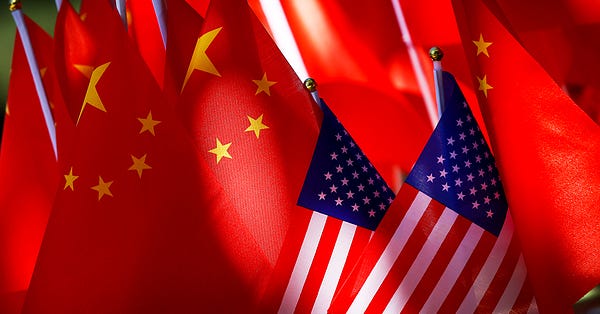
Mao's infatuation with Stalin, Deng's productivity-releasing reforms, and a deep dive into China’s household registration and dual land systems are all discussed in this wide-ranging podcast I did with Readara.
China: Capitalism, But Not As We Know It was the discussion of this interview I did with China’s executive MBA school CKGSB’s Knowledge Magazine.
And an interesting podcast on how COVID-19 and travel restrictions have affected Nigerian traders to China, from Trade Talks of the Peterson Institute.
